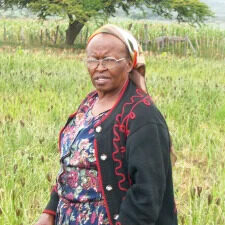History
The story of Mwandani International is one of compassion, resilience, and a deep commitment to transforming lives. What began in the 1980s as a grassroots effort by Niva Kegode to feed and support street children in Nakuru, Kenya, grew into a structured faith-based initiative dedicated to rehabilitation and empowerment.
With the unwavering support of her husband, James Kegode, Mwandani evolved from a small feeding program into a multifaceted organization addressing education, employment, and family reunification.
In 2018, Mwandani International was formally established in the United States, shifting its focus to rural development as a means of preventing urban homelessness. Today, MI continues to honor the legacy of Niva and James by fostering sustainable solutions that uplift communities and create lasting change.
“To effectively address the issue of street children in Kenya’s urban areas, we must tackle its root cause—poverty in rural communities. By creating opportunities and improving livelihoods in these areas, we can reduce rural-to-urban migration, ultimately preventing homelessness and the rise of street children.”
– Niva Kegode

1980’s
A Growing Crisis in Nakuru, Kenya: The early 1980s marked a turning point for Nakuru as the number of children living on the streets began to rise sharply. Witnessing this concerning trend, Niva Kegode, a compassionate resident of Nakuru, resolved to make a difference in the lives of these vulnerable children.
Grassroots Humanitarian Efforts Take Shape: Determined to address the plight of street children, Niva gathered a group of volunteers who began distributing food, clothing, and other essential supplies. This effort evolved into a feeding program supported by family, friends, and local businesses.
1990’s
Continued Commitment Amid Growing Challenges: With the unwavering support of her husband, James Kegode, Niva maintained her dedication to helping street children despite limited resources. Street feedings were conducted regularly, depending on the availability of financial resources.
2000’s
Rising Numbers and Resources Constraints: As the number of street children climbed to over 100, the strain on resources became increasingly difficult to manage. Despite these challenges, Niva and her team continued their work with perseverance.
Formation of Mwandani – A Faith-Based Initiative: To better address the growing needs of street children, Niva and James formally established Mwandani, a faith-affiliated organization supported by Kenyan and international donors. The program not only provided meals but also focused on rehabilitation efforts, including:
- Education: Helping children enroll in schools.
- Employment Support: Connecting youths to job opportunities.
- Entrepreneurship: Assisting with small business ventures.
- Medical Assistance: Providing healthcare access when possible.
- Family Reunification: Helping children reconnect with their families.
2010’s
A New Vision for Rural Communities: Recognizing the connection between rural poverty and urban street migration, James proposed shifting the organization’s focus to address challenges at their root. He believed that providing rural communities with opportunities could reduce urban homelessness.
Launch of Mwandani International (MI): To continue the impactful work of Niva and James, Mwandani International was launched as a 501(c)(3) tax-exempt nonprofit organization in the United States. MI’s mission centered on tackling the lack of rural opportunities that often forced individuals to migrate to urban areas, where many became homeless.
Tragically, both Niva and James passed away in 2018, leaving behind a powerful legacy.
Establishment of a Sustainable Agriculture and Value-Addition Teaching Farm: A teaching farm was established near Njoro, Nakuru County. Using sustainable farming practices, the farm cultivated sunflowers and dry edible beans with locally sourced inputs.
Understanding Rural Poverty: Additionally, a study on food security, poverty, rural industries, and employment opportunities was conducted across the counties of Busia, Nakuru, and Vihiga, revealing that Busia and Vihiga Counties faced the highest levels of poverty.
2020’s
Sweet Potato Value-Addition Project: In partnership with farmers in Vihiga County, MI implemented a value-added sweet potato project across three rural locations. In Bunyore, a processing unit was constructed using locally sourced materials to produce sweet potato flour, which could be used to make a variety of food products, promoting local agribusiness.
Global Pandemic Disruptions: The onset of the COVID-19 pandemic forced the temporary suspension of operations, impacting project activities and community engagement.
Strategic Revitalization: Despite previous challenges, MI emerged with a revitalized strategy focused on sustainable development and community empowerment, building on the Kegodes’ legacy of service and innovation.
